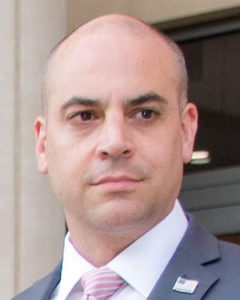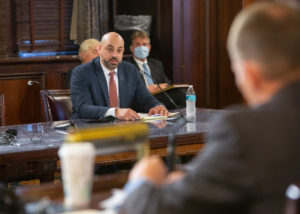Prosecutors are building bridges between the community and law enforcement
The unprecedented events of 2020 amplified a loss of trust and confidence in our criminal justice system felt deeply by some minority communities. This erosion is occurring at a time when, ironically, we have generally seen the most productive changes in improving the criminal justice system. All over the commonwealth are examples of prosecutors, law enforcement and the courts embracing diversion and rehabilitation as keys to breaking cycles of crime, preserving public safety, and ensuring justice. But initiatives in and of themselves are not enough, especially when minority, underrepresented, and vulnerable populations lack trust in criminal justice leaders. Trust must be restored, and in criminal justice, the District Attorney and the district attorney’s office has a large role to play in that process.
After the senseless killing of George Floyd, my office publicly re-committed to improving services for all citizens in York County. Our corner of Pennsylvania is incredibly enriched by its diverse community, and my office’s composition and policies should respond and reflect the need of the community. This not only means addressing threats to society, but also keeping families together, individuals working and being good stewards of taxpayer dollars. Policies that are evidence-based and bring forth the issues of diversity and representation among law enforcement and the citizens we serve are a smart path forward.
Supporting new policies and supporting law enforcement officers are not inconsistent concepts. Law enforcement officers on the street are on the front lines dealing with real issues in real time. The harshness and tragedy of addiction and the complexities of mental health are far too prevalent. With each passing day, society simultaneously puts law enforcement officers in the tenuous positions of protector, defender, servant, and social worker – all at a moment’s notice; many times over, within one 8-hour shift. They are expected to have the answer to every question and solution to every problem. We must never forget that their work is the backbone of every initiative and every policy change. Including law enforcement as part of our progress is our best hope to build bridges and restore trust with communities that have told us they have no faith in the current system.
I am not alone in this approach. In Bucks County, District Attorney Matt Weintraub worked with local police chiefs to modify guidance for officers to encourage better interactions with the community. The District Attorneys in Chester and Delaware Counties established task forces to examine race and justice, including law enforcement and representatives of minority communities. Several District Attorneys are also invested in a program called “Walking While Black” to foster a tough but important, open dialogue on how police interact with civilians.
District Attorneys read and watch the news. We log on to social media. We understand that there are measures which need to be taken to strengthen relationships, particularly between the black community and law enforcement (although we should also note that many people belong to both categories!) — but we also know that in reality, what the community needs from us is often different than what most of us read or hear.
The Pennsylvania District Attorneys Association (PDAA), and its education and training arm, the Pennsylvania District Attorneys Institute (PDAI), serve prosecutors from all over the Commonwealth, and are constantly working to stay up-to-date and share information and best practices on major issues affecting the public and law enforcement. I am privileged to serve as the PDAI’s education and training chair and have always appreciated the opportunity to listen and learn to what is happening and works in my colleague’s counties. While every district attorney’s perspective is different, I’ve always appreciated different viewpoints and respected the times when I’ve been exposed to a new idea or initiative. As we adjust to the changing complexities of criminal justice, my office over time has provided both insights up to the PDAA membership and taken guidance from others back to York County.
While we discuss these reforms, it is important to note that our police and prosecutors do an overwhelming amount of good in our communities. While all of us have heard the cries of “defund the police” and law enforcement in general (most ubiquitously online and on social media), a substantial majority — over 80% — of black Americans support the same amount or more police in their neighborhoods. Similarly, dismissing the calls for change in the name of supporting law enforcement does not account for the fact that supporting law enforcement and supporting meaningful and thoughtful improvements are not mutually exclusive. Yet, no one knows this unless we engage in conversation and most importantly listen to one another. Building a relationship with any one person takes time, patience, and understanding. Building relationships with entire communities takes all of those things plus the addition of good old-fashioned hard work.
The times are changing, and we need to adapt to ensure that our judicial system is neither stuck in the past nor jeopardizes the safety in the future. Striking that balance in an earnest and transparent way goes a long way to build relationships and trust in the communities we clearly have work to do in. I believe that this is the goal of today’s prosecutors. When we achieve that goal communities of every color and creed all win.
 Dave Sunday is the District Attorney of York County, Pennsylvania.
Dave Sunday is the District Attorney of York County, Pennsylvania.

